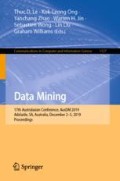Abstract
Smartphones have become the ultimate ‘personal’ computers with sufficient processing power and storage to perform machine learning tasks. Building on our previous research, this paper investigates an example practical application of this capability, combining it with a smartphone’s on-board sensors to develop a personalised, self-contained machine-learning framework for monitoring mental health. We present a mobile application for Android devices called ‘Mindful’ that incorporates data collection from the phone’s sensors and data sources, pre-processes the data locally and executes data mining on that data to provide pre-emptive feedback to the phone user about their mind state. Rather than as a finished product, this application is presented as a first step to show that from a technological perspective, smartphones are well equipped to perform this type of role. We invite colleagues from the mental health sciences to join us in furthering this work into a smart monitor for mental health.
Access this chapter
Tax calculation will be finalised at checkout
Purchases are for personal use only
References
Yates, D., Islam, Md.Z., Gao, J.: Implementation and performance analysis of data-mining classification algorithms on smartphones. In: Islam, R., et al. (eds.) AusDM 2018. CCIS, vol. 996, pp. 331–343. Springer, Singapore (2019). https://doi.org/10.1007/978-981-13-6661-1_26
Yates, D., Islam, M.Z., Gao, J.: DataLearner: a data mining and knowledge discovery tool for android smartphones and tablets. arXiv preprint arXiv:1906.03773 (2019)
Depression (n.d.). https://www.who.int/news-room/fact-sheets/detail/depression. Accessed 24 July 2019
Slade, T., Johnston, A., Oakley Browne, M.A., Andrews, G., Whiteford, H.: 2007 National Survey of Mental Health and Wellbeing: methods and key findings. Aust. N. Z. J. Psychiatry 43(7), 594–605 (2009)
Jeong, T., Klabjan, D., Starren, J.: Predictive analytics using smartphone sensors for depressive episodes. arXiv preprint arXiv:1603.07692 (2016)
Shen, N., et al.: Finding a depression app: a review and content analysis of the depression app marketplace. JMIR mHealth uHealth 3(1), e16 (2015)
Scherr, S., Goering, M.: Is a self-monitoring app for depression a good place for additional mental health information? Ecological momentary assessment of mental help information seeking among smartphone users. Health Commun. 77, 1–9 (2019)
Arora, S., Yttri, J., Nilsen, W.: Privacy and security in mobile health (mHealth) research. Alcohol Res.: Curr. Rev. 36(1), 143 (2014)
Bakker, D., Kazantzis, N., Rickwood, D., Rickard, N.: Mental health smartphone apps: review and evidence-based recommendations for future developments. JMIR Ment. Health 3(1), e7 (2016)
Palmius, N., et al.: A multi-sensor monitoring system for objective mental health management in resource constrained environments (2014)
Lorant, V., Croux, C., Weich, S., Deliège, D., Mackenbach, J., Ansseau, M.: Depression and socio-economic risk factors: 7-year longitudinal population study. Br. J. Psychiatry 190(4), 293–298 (2007)
Westoby, R., Westoby, R.: Mental Health, Housing and Homelessness: A Review of Issues and Current Practices, 2016 (2017)
Humphry, J.: Homeless and connected: mobile phones and the Internet in the lives of homeless Australians (2014)
Pash, C.: Smartphones have tightened their grip on Australian lives. https://www.businessinsider.com.au/smartphones-use-australia-deloitte-2018-11. Accessed 24 July 2019
Cornet, V.P., Holden, R.J.: Systematic review of smartphone-based passive sensing for health and wellbeing. J. Biomed. Inform. 77, 120–132 (2018)
Chen, Z., et al.: Unobtrusive sleep monitoring using smartphones. In: Proceedings of the 7th International Conference on Pervasive Computing Technologies for Healthcare. ICST (Institute for Computer Sciences, Social-Informatics and Telecommunications Engineering) (2013)
Kroenke, K., Spitzer, R.L.: The PHQ-9: a new depression diagnostic and severity measure. Psychiatric Ann. 32(9), 509–515 (2002)
Moriarty, A.S., Gilbody, S., McMillan, D., Manea, L.: Screening and case finding for major depressive disorder using the Patient Health Questionnaire (PHQ-9): a meta-analysis. Gen. Hosp. Psychiatry 37(6), 567–576 (2015)
Fox, K.R.: The influence of physical activity on mental well-being. Public Health Nutr. 2(3a), 411–418 (1999)
Ben-Zeev, D., Scherer, E.A., Wang, R., Xie, H., Campbell, A.T.: Next-generation psychiatric assessment: using smartphone sensors to monitor behavior and mental health. Psychiatr. Rehabil. J. 38(3), 218 (2015)
Nezlek, J.B., Imbrie, M., Shean, G.D.: Depression and everyday social interaction. J. Pers. Soc. Psychol. 67(6), 1101 (1994)
Quinlan, J.R.: C4. 5: Programs for Machine Learning. Elsevier (2014)
Breiman, L.: Random forests. Mach. Learn. 45(1), 5–32 (2001)
Reiter, E., Dale, R.: Building applied natural language generation systems. Nat. Lang. Eng. 3(1), 57–87 (1997)
Weka 3: Machine Learning Software in Java (n.d.). https://www.cs.waikato.ac.nz/ml/weka/. Accessed 24 July 2019
Author information
Authors and Affiliations
Corresponding author
Editor information
Editors and Affiliations
Rights and permissions
Copyright information
© 2019 Springer Nature Singapore Pte Ltd.
About this paper
Cite this paper
Yates, D., Islam, M.Z. (2019). Readiness of Smartphones for Data Collection and Data Mining with an Example Application in Mental Health. In: Le, T., et al. Data Mining. AusDM 2019. Communications in Computer and Information Science, vol 1127. Springer, Singapore. https://doi.org/10.1007/978-981-15-1699-3_19
Download citation
DOI: https://doi.org/10.1007/978-981-15-1699-3_19
Published:
Publisher Name: Springer, Singapore
Print ISBN: 978-981-15-1698-6
Online ISBN: 978-981-15-1699-3
eBook Packages: Computer ScienceComputer Science (R0)

